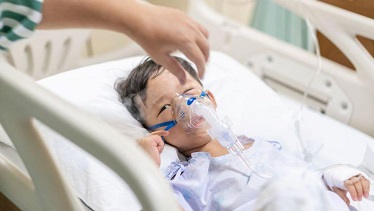German Study Shockingly Reveals That Pulmonary Dysfunction Accompanies Many Long COVID Kids Despite Fallacies That COVID-19 Is Mild In Children!
Source: Pediatric COVID-19 - Long COVID Kids Feb 26, 2022 3 years, 9 months, 2 weeks, 18 hours, 47 minutes ago
A new study by German researchers from Friedrich-Alexander-Universität (FAU) Erlangen-Nürnberg and its University Hospital Erlangen along with experts from Hannover Medical School have found that many pediatric COVID-19 patients continue to develop lung issues and dysfunction despite recovery from COVID-19. Many of these kids still experience persistent sequelae after SARS-CoV-2 infection and are now termed as
long COVID Kids.

The frequency and extent of persistent sequelae in children and adolescents after infection with SARS-CoV-2 has to date not been properly studied.
The study team in this cross-sectional clinical trial, used non-invasive, label-free morphologic and free-breathing phase-resolved functional low-field magnetic resonance imaging (LF-MRI) to identify pulmonary changes in children and adolescents from 5 to <18 years after previously PCR-confirmed SARS-CoV-2 infection.
https://clinicaltrials.gov/ct2/show/NCT04990531
Although morphological pathologies were less frequent in children, functional LF-MRI visualized widespread ventilation, perfusion and combined ventilation/perfusion defects were more widespread compared to healthy controls.
The loss of functional lung parenchyma was more pronounced in long Covid kids. While pulmonary dysfunction was persistent even month after primary infection, LF-MRI demonstrated high capability to visualize and detect these changes in children and adolescents.
The study findings were published on a preprint server and are currently being peer reviewed.
https://www.medrxiv.org/content/10.1101/2022.02.21.22270909v1
The study team examined the pulmonary dysfunction persistent in pediatric populations post-acute coronavirus disease 2019 (COVID-19) infection.
Numerous past studies wrongly suggested that COVID-19 manifests with milder symptoms in children as compared to adults.
Newly emerging evidence indicates the occurrence of acute symptoms and sequelae post severe acute respiratory syndrome coronavirus 2 (SARS-CoV-2) infection in pediatric patients are just as high as adults.
Due to this emerging evidence, it is essential to exhaustively study the characteristics of COVID-19 manifestations in adolescents and children.
The study team investigated pulmonary dysfunction by characterizing both functional and morphological alterations in the lung parenchyma in pediatric patients after acute SARS-CoV-2 infection confirmed by polymerase chain reaction (PCR) tests.
An extensive cross-sectional, single-center clinical trial initiated by the tsuy team was conducted involving PCR-positive COVID-19 patients of ages ranging from five to less than 18 years.
A control group with children and adolescents belonging to the same age group was also included in the study. They had negative serological antibody results post hoc, negative medical history, and no prior COVID-19 vaccination.
The pediatric participants with Long-COVID were identified on the basis of symptoms persistent for at least 1
2 weeks and belonging to one of the classifications of persistent symptoms from acute COVID-19 infection or related treatment, symptoms leading to a novel health problem, occurrence of new symptoms post-acute COVID-19 but indicated to be COVID-19 sequelae, and worsening of a pre-existing condition.
Bio specimens such as blood samples were collected from the study cohorts to examine blood count, C-reactive protein (CRP), interleukin 6 (IL-6), and SARS-CoV-2 antibodies.
Subsequently, low-field magnetic resonance imaging (LF-MRI) was performed for all participants to facilitate the visualization of morphological features, perfusion, and the ventilation of the lung.
The research findings showed that from 9 August 2021 to 30 December 2021, 91 pediatric patients tested PCR-positive for COVID-19, and 17 healthy controls were screened for the study, among which 54 COVID-19 patients and nine controls were eligible for the study.
In the study cohort of patients infected with SARS-CoV-2, 11.5±3.2 years was the mean age, 47.6±17.9kg was the mean weight, while 155.7±17.3cm was the mean height. Also, a total of 44% of the participants were female, and 46% of patients were reported to have Long-COVID.
As for COVID-19 symptoms, a total of 9% of the pediatric patients had headaches, 28% had dyspnea, 2% had pneumonia, 7% had anosmia, 2% had ageusia, 7% had fatigue, 11% had impaired attention, 2% had limb pain, 30% had shortness of breath. In contrast, four PCR-positive patients reported no symptoms of acute COVID-19 infection.
It was found that among the individuals scanned with LF-MRI, only one recovered SARS-CoV-2 patient had morphological alterations with pulmonary consolidations, while the other patients showed no morphological changes.
However, in the comparison of healthy controls with recovered patients and Long-COVID patients, the team observed an increase in perfusion defects from 6.5±5.0% to 19.5±19.1% to 21.6±18.6%, ventilation defects from 12.8±3.6% to 22.1±8.1% to 24.6±10.0%, and combined defects from 0.5±0.8% to 3.9±4.7% to 5.4±6.6%, respectively.
The study team also observed a decrease in the unaffected lung parenchyma from 81.2±6.1% in healthy controls to 60.8±19.1% in post-acute COVID-19 patients. Further, normal functional lung parenchyma was decreased from 81.2±6.1% to 62.0±18.7% to 59.9±19.8 in healthy controls, recovered patients, and Long-COVID patients, respectively.
Based on the laboratory assessments, four COVID-19 patients had negative SARS-CoV-2 spike protein and negative SARS-CoV-2 nucleocapsid antibody levels. In comparison, two post-acute COVID-19 patients showed the presence of spike protein antibodies in the absence of nucleocapsid antibodies.
Interestingly, all the healthy controls showed negative nucleocapsid and spike protein antibody levels.
The research findings alarmingly showed that acute COVID-19 could cause extensive damage to the pulmonary system, including perfusion, ventilation, and combined defects in children. Manifestations of pulmonary dysfunction were persistent in pediatric patients even after months post-infection.
The research findings illustrated that functional lung changes are prevalent in acute COVID-19-infected children and adolescents. Further monitoring of persistent pulmonary damage in these young populations is essential to incorporate additional care in COVID-19-related clinical routine care.
Please help by donating to help sustain this website and also support all our research and community initiatives. Yoru help counts and saves lives directly and indirectly.
https://www.thailandmedical.news/p/sponsorship
For the latest on
Long COVID Kids, keep on logging to Thailand Medical News.
